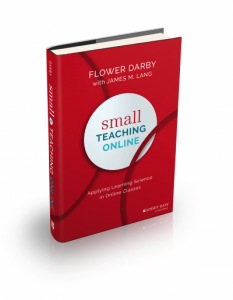At 22 years old, Flower Darby began teaching as part of her graduate program and realized during that first semester, how much she loved the profession. Around that time, Darby also began assisting and substituting for dance classes. “I had been dancing all my life,” shares Darby. “I started helping with classes and then began offering my own dance and fitness classes. I found that the principles of effective teaching can apply to all different subjects and formats.”
Several years ago, Darby was offered an instructor position for an online class. Out of curiosity, she agreed, but was unsure if she would like the format. “For the same reasons many faculty members struggle with online teaching, I didn’t know if I would like a virtual format. Thankfully, I had an excellent mentor who helped demonstrate what effective online teaching looks like, and after a short time, I was surprised how much I enjoyed online learning and instruction.”
After attending a conference that focused on instructional design and ways to improve online education, Darby found the topic so fascinating that she applied for a position in the field. “I found this new role invigorating and began to learn more and more about learning science,” shares Darby. “I had been teaching for a long time and had learned a great deal from trial and error. Now, I was able to explore the theory that supported what I already knew intuitively. I continue to be fascinated by learning science and how we can use these principles to be more effective in our teaching, no matter the format or discipline.”
Inspiring Learner Optimism and Success
Over her 24-year career, Darby has taught a variety of subjects, including English, Technology, Leadership, Dance, and Pilates, at both community colleges and universities. “I’ve always wanted my learners to be successful,” says Darby. “No matter the age, class, or context, I encourage my students to find the joy in that topic. I teach technology fluency, for example, and I try to show how technology offers us so much potential; providing countless new opportunities. Especially for those students nervous about technology, I share my own enthusiasm and passion in hopes to motivate these individuals to feel optimistic about their ability to succeed. I try to make class as fun and enjoyable as possible, so students are excited to be there and open to learning. This theme is a common thread that runs through everything that I teach.”
As an educator, author, and speaker who specializes in online teaching and training best practices, Darby currently consults with faculty and business teams around the globe on effective teaching for learners’ success. “In working with faculty, I apply the exact same principles that I do with students,” explains Darby. “Engagement comes before learning. I want to inspire them, convey my enthusiasm, and share my optimism for how teaching online can be a very good experience.”
“In academia and beyond, there is often a long-held belief that the pursuit of knowledge must be rational and logical, with no room for emotion. However, recent neuroscience research has revealed that emotions and cognition are intricately linked. We cannot think without feeling, so we must put emotions to work for us to improve teaching and learning outcomes.”
— Flower Darby

Tapping into Emotion Science
Darby shares her expertise and experience as a columnist for the Chronicle of Higher Education and in her book, Small Teaching Online with James M. Lang. Coming out soon, her new book, The Spark of Online Learning: How Technology and Emotion Science Ignite Engagement in Every Class, discusses how we can put emotions to work for us. “In academia and beyond, there is often a long-held belief that the pursuit of knowledge must be rational and logical, with no room for emotion. However, recent neuroscience research has revealed that emotions and cognition are intricately linked,” explains Darby. “We cannot think without feeling, so we must put emotions to work for us to improve teaching and learning outcomes.”
In virtual environments, Darby says we need every available tool in our online teaching toolkit. “I believe that one of the most powerful teaching tools is our emotions. They are very powerful and grab our attention, motivate us, and help us remember information. By using emotions, we can engage students to pay attention to classwork, stay focused, and dig in to get a deeper level of understanding. Conveying your own enthusiasm and positivity as an instructor motivates learners— a concept that is directly derived from emotion science.”
As part of Edge’s EdTech Summer Webinar Series on June 9, 2021, Darby, along with James M. Lang, will discuss Emotional Presence in Online Teaching for Increased Student Engagement, Persistence, and Success. “Together we will discuss the unique challenges that we’re facing with online learning and teaching,” says Darby. “By taking time to consider what is uniquely difficult and problematic about the online format and teaching in online spaces, we can better understand what we’re up against. With this insight, we can then identify and implement thoughtful and effective solutions to overcome these challenges. We also explored theoretical frameworks and several practical strategies that attendees can apply in their organizations on day one. These practices are specifically designed to help engage students in online environments and boost overall learning and success.”
Embracing New Learning Tools
Many institutions have been forced to shift to online learning or a hybrid model quickly amid the pandemic, leaving some organizations and their faculty unprepared for the rapid change. “I do believe online learning can be fulfilling and meaningful for our students and for us,” says Darby. “But I encourage faculty to be kind to themselves; to be patient and compassionate during this transition. You should not expect to be as adept in this different format as you are in person. Over time, you are gaining new knowledge, experience, and skills that will help you become an even more effective teacher. Even as in-person teaching resumes, we will have gained several new tools and strategies that we can employ to enhance what we do in the classroom and improve students’ motivation, focus, memory, and overall learning.”
You can learn more about Flower Darby’s upcoming events and book release at flowerdarby.com.
Visit EdgeEvents via njedge.net/events to reserve your spot for the EdTech Summer Webinar Series.
For innovative solutions that can help enhance the online instructional and learning experience, visit https://njedge.net/solutions-overview/digital-learning/.



